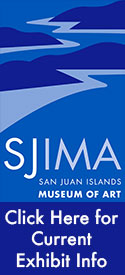Lost calf…. seen it?
Posted September 1, 2009 at 10:49 pm by Ian Byington
Amy Traxler from the Whale Museum’s Marine Stranding Network asked that we get the word out:
HAS ANYBODY SEEN A STRANDED KILLER WHALE CALF?
On Sunday, August 30th a private boater broadcast a report over the marine radio, Channel 16, that they had discovered what appeared to be a killer whale calf floating off of Lawrence Point near Orcas Island. The observer stated that the placenta was still attached to the carcass.
The Friday Harbor sheriff’s office heard the broadcast and passed the information on to the San Juan County Marine Mammal Stranding Network. A fishing tender also picked up the information and notified the Network’s Coordinator, Amy Traxler.
“The captain of the vessel called me at home on Sunday morning, saying they had received the coordinates of the (supposed) carcass and were almost at that location,” says Traxler. “He offered to look for the carcass and proceeded to do so for over an hour in pea soup fog with no luck.” Traxler also searched the area for several hours Sunday afternoon but found nothing.
Even though the Network does receive periodic calls of dead whales, they usually turn out to be porpoise. Last year, however, a killer whale calf did wash up in Open Bay on Henry Island. Unfortunately, it wasn’t reported until several days later and the carcass was too decomposed to get much information out of it. DNA tests did determine that it was an aborted fetus from a member of the Southern Resident Community.
“Retrieving carcasses of killer whales is rare and invaluable,” said Joe Gaydos, Chief Scientist at the SeaDoc Society and the Network’s veterinarian. “Only approximately 10% of the carcasses from Southern Resident killer whales are ever found which makes it difficult for us to determine the role that disease could be playing in slowing the recovery of this population.”
If anyone finds this carcass, please call the Stranding Network immediately at 1-800-562-8832 and leave a message. Traxler also recommends if the carcass is found floating to tie a fender or some object to the carcass to make it easier to find.
The San Juan County Marine Mammal Stranding Network is run by the Whale Museum (www.whalemuseum.org).
You can support the San Juan Update by doing business with our loyal advertisers, and by making a one-time contribution or a recurring donation.
Categories: Enviro Corner










No comments yet. Be the first!
By submitting a comment you grant the San Juan Update a perpetual license to reproduce your words and name/web site in attribution. Inappropriate, irrelevant and contentious comments may not be published at an admin's discretion. Your email is used for verification purposes only, it will never be shared.